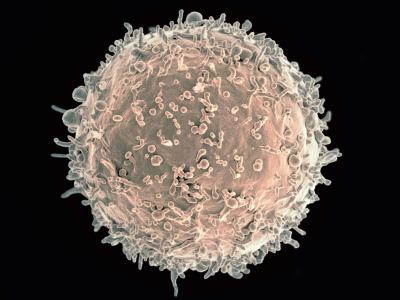
Colorized scanning electron micrograph of a B cell from a human donor.
The goal of this program is to support high-throughput discovery and validation of novel B cell epitopes associated with antibody-mediated disease (e.g., severe allergy, autoimmunity, and transplant rejection) and antibody-mediated protection against infection. This longstanding program was initiated in 2009 and was most recently renewed in 2024.
Main Area of Focus
- Human B cell epitope discovery and BCR repertoire profiling
- Epitope validation and mechanisms of monoclonal antibody effector function
- Structural characterization of epitopes and corresponding monoclonal antibody binding
- Deposition of epitope and monoclonal antibody data into the Immune Epitope Database and Analysis Resource (IEDB)
About the Program
Epitope validation is a critical component of B cell epitope discovery and a major focus area of this program. Epitope validation involves determining the functional role of antibodies in preventing or causing disease when targeting a given epitope. Detailed below are the molecular and cellular mechanisms that antibodies utilize to mediate protection or cause disease when targeting epitopes.
In the context of infection, direct neutralization of pathogens occurs when monoclonal antibodies target key epitopes to block pathogen entry. In addition to pathogen neutralization, Fc-dependent antibody functions occur when innate effector cells kill pathogens or infected cells through mechanisms that include antibody-dependent cellular cytotoxicity (ADCC), antibody-dependent phagocytosis (ADCP), and complement-dependent cytotoxicity (CDC). This program supports preclinical evaluation of human or humanized monoclonal antibodies that protect against infection by targeting key epitopes through the above mechanisms.
In the context of autoimmune disease or transplant rejection, the mechanisms described above can cause damage to human tissue when monoclonal antibodies inadvertently bind to human ‘self’ epitopes. Improved understanding of the generation of these disease-causing antibodies and the epitopes they target could advance prevention strategies for autoimmune disease and methods to enhance transplant acceptance.
In the context of allergy, IgE antibodies bind to allergens (e.g., food, pollen, mold), inducing mast cell degranulation and causing severe immune responses. Improved understanding of the molecular features and epitope specificities of disease-causing IgE antibodies could advance allergen immunotherapy development.
Awarded Contracts
In 2024, six contracts were awarded to the following U.S. institutions:
Wadsworth Center New York State Department of Health /Health Research, Inc., Albany, NY
Project title: Innovations in Functional B Cell Epitope Discovery for Lyme Disease
Principal Investigator: Nicholas Mantis, Ph.D.
Vanderbilt University Medical Center, Nashville, TN
Project title: Innovations in Functional B Cell Epitope Discovery for Paramyxoviruses
Principal Investigator: James Crowe, M.D.
Stanford University, Redwood City, CA
Project title: Innovations in Functional B Cell Epitope Discovery for Food Allergy
Principal Investigator: Scott Boyd, M.D., Ph.D.
Washington University, St. Louis, MO
Project title: Functional B cell Epitope Discovery for Flaviviruses and Alphaviruses
Principal Investigator: Daved Fremont, Ph.D.
Integral Molecular, Philadelphia, PA
Project title: B cell Epitope Discovery and Mechanisms of Antibody Protection for Enteroviruses and Bunyaviruses
Principal Investigator: Benjamin Doranz, Ph.D., MBA
Duke University Medical Center, Durham, NC
Project title: Innovations in Functional B Cell Epitope Discovery for Influenza
Principal Investigator: Garnett Kelsoe, D.Sc.

